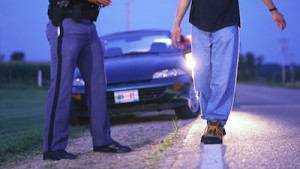Seeing the flashing blue lights of a police car in your rearview mirror can instantly cause your heart to skip a beat. However, this stress can become even more amplified when a police officer asks you to step out of your vehicle and perform standardized field sobriety tests. At this point, a simple traffic stop has turned into a Driving While Impaired (DWI) investigation, which, based off of the officer’s observations, may lead to a DWI arrest. As such, what are the consequences of refusing to do standardized field sobriety tests in Wilmington, NC?
Field Sobriety Tests
Due to a growing need for tools to aid police officers in identifying potential drunk drivers, the National Highway Traffic Safety Administration (NHTSA) established several different field sobriety tests. The three tests that are used in North Carolina for DWI investigations are: the Horizontal Gaze Nystagmus test, the Walk and Turn test, and the One Leg Stand test. These tests have been developed by NHTSA to provide a police officer information regarding the probability of whether an individual is above the legal limit of 0.08 Blood Alcohol Concentration (BAC).
 Providing Evidence
Providing Evidence
In some cases, people are eager to perform field sobriety tests because they believe that their performance will show the police officer that they are not impaired. However, although proving to an officer that you are not drunk is beneficial, it is important to note that anything you do can be used against you at a later point (like in trial). Additionally, unless you have done these tests before, you have no idea what the proper procedure is, what the police officer is looking for, or what constitutes “passing” or “failing.” As such, it may be smart to weigh the pros and cons of whether to provide potential evidence to the police officer in the DWI investigation.
Refusing Field Sobriety Tests
Under North Carolina law, you cannot be forced to perform field sobriety tests and will not face an immediate loss of your licensing privileges (which is not the case for refusing a chemical analysis). However, if you do refuse to perform field sobriety tests, under North Carolina General Statute § 20-139.1(f), your refusal of those field sobriety tests is admissible in any criminal, civil, or administrative action against you later. In other words, the police officer will not only be able to put in the report that you refused the standardized field sobriety tests, but the officer will also be able to testify that you refused the standardized field sobriety tests at any hearing or trial in your case. Additionally, the police officer will typically use the refusal (along with any other observations leading to impairment) to either arrest you immediately for DWI, or as the basis to justify a trip down to the police station for further investigation and a chemical analysis. As such, if you decide to refuse to perform field sobriety tests, be aware of the consequences and do it politely and in a manner that does not inflame the situation.
Contact Us
If you have questions about refusing field sobriety tests, or are facing criminal charges for DWI, CALL or email our office today, and we’ll be happy to assist you. Our consultations are always free and our attorneys are standing by to assist you with your case.
From the Minick Law Blog:
- Where Can I Find a DWI Alcohol Assessment Service Provider in the Wilmington Area?
- What Should I Do If I’ve Been Charged With Possession of Marijuana In Wilmington, NC?
- Where Can I Find An Ignition Interlock Provider in the Wilmington, NC Area?
- How Should You Handle An Underage Drinking Ticket in Wilmington, NC?




























